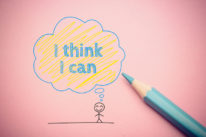
“With realization of one’s own potential & self confidence in one’s ability, one can build a better world.” ~Dalai Lama
For the vast majority of my life I didn’t believe I could do most of the things I wanted to do.
I knew I wanted to be in a relationship, but I feared that if I got into one I’d do something to mess it up.
I wanted to perform on Broadway, but even moving to New York City didn’t give me the courage to audition.
I wanted to be a writer, but I thought it was far too difficult to get published and therefore didn’t even try until my late twenties.
Maybe you’ve never been as unsure of yourself as I used to be, but you can likely relate to that feeling of wanting to do something but feeling terrified to start. This not only limits your potential in life; it also minimizes your ability to make a positive impact on the world around you.
There’s a lot that goes into overcoming those fears. You may need to challenge limiting beliefs formed years ago, or take yourself out of a situation where other people undermine your abilities. One thing that will definitely help is working on your confidence.
Not sure if confidence can be learned? I asked this question on the Tiny Buddha Facebook page to see what readers had to say and then used some of their responses to shape the steps outlined below:
1. Tap into the confidence you were born with.
I feel it’s something that is always there, something you’re born with that gets lost along the way, or stolen by others. Sometimes you have to dig deep to find it again. ~Amy Lee Tempest
You didn’t come out of the womb unsure of your cry or insecure about your large umbilical cord. You came out blissfully unaware of external judgment, concerned only with your own experience and needs. I’m not suggesting that you should be oblivious to other people. It’s just that it may help to remember confidence was your original nature before time started chiseling away at it.
Once you developed a sense of self-awareness, you started forming doubts and insecurities about how other people saw you. You learned to crave praise and avoid criticism, and maybe you started getting down on yourself if you got more of the latter than the former.
When you start feeling unsure of yourself remember: we were all born with confidence, and we can all get it back if we learn to silence the thoughts that threaten it.
2. Know your strengths and weaknesses.
As you learn who you are, you gain confidence in your strengths and also learn your weaknesses. ~Angela Birt
Learning who you are doesn’t happen overnight. For one thing, it can be hard to know which parts of you are you, and which parts are who you think you should be.
A good start is to identify your strengths and weaknesses and then weigh those against what you enjoy. (If you’re great in sales, but you actually can’t stand sales jobs, then it doesn’t really matter if you have confidence there. Unless it’s all about ego—but does that really make you happy?)
It might help to list five things you do well that you enjoy and five things you’d like to do well. Make an effort to utilize some of the first list and work on some of the second every day. As you use your strengths and improve where there’s room to grow, you’ll develop both confidence and fulfillment simultaneously.
3. Expect success.
Confidence comes from success…But confidence also combines another quality because you can be successful, yet lack confidence. It requires a mental attitude shift to an expectation of success. And this alone, can bring about more success, reinforcing the confidence. It spirals from there. ~Jason Hihn
It might seem strange to say expect success since you can’t predict the future, but don’t we do the alternative all the time? Have you ever gone into a stressful situation assuming the worst—that something would go wrong?
Conventional wisdom suggests it’s smart to expect the worst because you won’t be disappointed if you fail and you’ll be pleasantly surprised if you succeed. But research suggests this isn’t universally true. Pessimism can undermine your performance creating a self-fulfilling prophecy.
Find the successes in every day and you’ll notice over time that they increase.
4. Trust your capabilities.
Confidence comes not from knowing you know everything, but from knowing you can handle what comes up. ~Donn King
No one in the world knows everything. Everyone is good at some things and not so good at others. Don’t weigh your security against what you know or can do; weigh it against your willingness and capacity to learn.
If someone criticizes you, take it as an opportunity to improve. If someone does better than you, see it as an opportunity to learn from them. If you fall short at something, realize you can get closer next time. Don’t worry if you’re not confident in what you can do now—be confident in your potential.
5. Embrace the unknown.
Confidence comes from a space of humility. It is spawned when we dare to see the world through an alternate lens. It grows when we have the courage to embrace the experience of the unknown and the unknowable. ~Hana Lee
People often think confidence means knowing you can create the outcome you desire. To some extent it does, but this idea isn’t universally true for anyone. No matter how talented, smart, or capable you are, you cannot predict or control everything that happens in your life.
Even confident people lose jobs, relationships, and sometimes, their health.
Confidence comes from knowing your competence but acknowledging it’s not solely responsible for creating your world. When you take that weight off your shoulders and realize that sometimes the twists and turns have nothing to do with what you did or should have done, it’s easier to feel confident in what you bring to the table.
6. Take risks.
Confidence is a funny thing. You go out and do the thing you’re most terrified of, and the confidence comes afterwards. ~Christopher Kaminski
If you always do things as you’ve always done them of course you won’t feel confident.
When I first moved to San Francisco, I was highly insecure with relationships. I’d moved a lot and spent years hopping around the country partly to avoid getting close to anyone. Eventually I realized the only way out was through. I’d never be good at relationships if I didn’t jump in, get messy, and learn what to do and not to do.
I had to crawl, walk, fall, and repeat to get comfortable with vulnerability and conflict. I made tons of mistakes, and a lot of it hurt. But I live a peopled life now, and it’s worth all the discomfort it took to get here.
7. Learn to receive praise.
Confidence is earned through positive recognition and reinforcement. ~Don La Franchi
It’s amazing how easy it is to believe all the negative things people say and yet discredit the positive. Taking a compliment is an art. Sometimes, it’s instinctive to assume they’re just being nice or that maybe you aren’t really skilled—you just got lucky.
Occasionally, this may be true, but for the most part you earn the praise you receive. Don’t talk yourself out of believing it. Instead, recycle it into confidence. You did a fantastic job on your project at work; that means you can do it again. You had an amazing performance; that means you can trust you’re talented.
Other people want you to succeed. Now you just have to believe them when they show you you’re worthy.
8. Practice confidence.
It can be practiced—and with that practice you will get better. ~Jacqueline Wolven
Like anything else in life, your confidence will improve with practice. A great opportunity to do this is when you meet new people. Just like if you were the new kid in school, they have no idea who you are—meaning you have an opportunity to show them.
As you shake their hand, introduce yourself, and listen to them speak, watch your internal monologue. If you start doubting yourself in your head, replace your thoughts with more confident ones. Ask yourself what a confident person would do and then try to emulate that.
Watch your posture and your tone. Hunching and mumbling will make you feel and look less confident, so stand up and speak slowly and clearly.
People are more apt to see you how you want to be seen if they suspect you see yourself that way.
—
You may have confidence in some areas and not in others; that’s how it works for most of us. Draw from those areas where you’re self assured.
If you feel inadequate in professional situations, recall how it feels physically when you’re confident in relationships. If you’re insecure in love, access what you feel when you’re comfortable around friends.
Above all, remember you are capable and worthy—just as much as anyone else, regardless of what you’ve achieved, regardless of what mistakes you’ve made. Knowing that intellectually is the first step to believing it in your heart. Believing it is the key to living it. And living it is the key to reaching your potential.
NOTE: I apologize if I did not respond to your comment. When the numbers get a little high, it can be hard to keep up! If you’d like to get personal advice, you may want to join the Tiny Buddha forums to get insight and support from the whole community.
About Lori Deschene
Lori Deschene is the founder of Tiny Buddha. She started the site after struggling with depression, bulimia, and toxic shame so she could recycle her former pain into something useful and inspire others do the same. She recently created the Breaking Barriers to Self-Care eCourse to help people honor their needs—so they can feel their best, be their best, and live their best possible life. If you’re ready to start thriving instead of merely surviving, you can learn more and get instant access here.
- Web |
- More Posts













 Though I run this site, it is not mine. It's ours. It's not about me. It's about us. Your stories and your wisdom are just as meaningful as mine.
Though I run this site, it is not mine. It's ours. It's not about me. It's about us. Your stories and your wisdom are just as meaningful as mine.